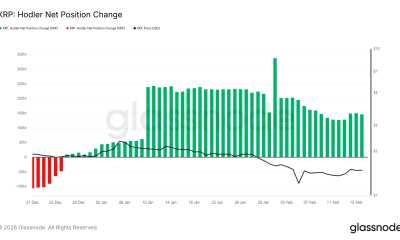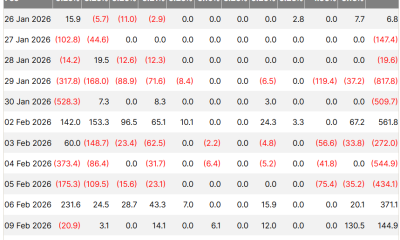Video
XRP REGS BANKING UPDATE

#xrp #bitcoin #hbar #xlm #eth
🚨SHOW ME YOUR BEST CRYPTO MEMES HERE🚨
https://x.com/HobbiesCards/status/2021979181803090077
https://twitter.com/HobbiesCards
February 19th will be another meeting hosted by the White House for crypto and banking people to come to an understanding. Meanwhile, stablecoins aren’t attracting any new money, crypto spot volume as eroded 50% and more players are leaving the market altogether. Peter Theil and ETHZILLA have turned into a huge flop. Proof that crappy companies buying crypto are still crappy companies. XRP is the 2nd most asked about asset behind btc, but that isn’t helping the price is it. Ethereum is losing lots of support as well during this downturn. Altcoin season is now, renamed to POOP SEASON as we are all taking a big bite out of the poop sammich. Clarity Act, well we got until the end of April. Tick Tock.
🚨ARTICLE LINKS🚨
https://defillama.com/stablecoins
read://https_coinmarketcap.com/?url=https%3A%2F%2Fcoinmarketcap.com%2Facademy%2Farticle%2Fwlfi-token-surges-22percent-before-mar-a-lago-crypto-forum
read://https_coinpaper.com/?url=https%3A%2F%2Fcoinpaper.com%2F14734%2Fethereum-news-peter-thiel-exits-eth-treasury-firm-eth-zilla-amid-ethereum-price-collapse
read://https_beincrypto.com/?url=https%3A%2F%2Fbeincrypto.com%2Fgemini-stock-drops-following-leadership-overhaul%2F
read://https_www.cryptopolitan.com/?url=https%3A%2F%2Fwww.cryptopolitan.com%2Fhyperliquid-washington-defi-policy-push%2F
read://https_investinghaven.com/?url=https%3A%2F%2Finvestinghaven.com%2Fcrypto-blockchain%2Fcoins%2Fxrp%2Fxrp-just-became-cryptos-most-talked-about-asset-after-bitcoin-whats-really-happening%2F
https://x.com/Grayscale/status/2023427386298241196?s=20
https://coinmarketcap.com/currencies/xrp
XRP news today
XLM news today
best trading strategy for crypto
how to make crypto coin and earn money
crypto arbitrage strategy
source
Video
Honest Financial RoadMap that Nobody Tell Us – for your Age : 20’s to 35

Instagram ❤️:https://www.instagram.com/amandhattarwal/
Facebook Page: https://www.facebook.com/dhattarwalaman/
Twitter: https://twitter.com/AmanDhattarwal
Want to Work with us? Apply for Job here : https://bit.ly/workWithUs
source
Video
Copper Trends & Global Upheaval Signals? |Financial & Geopolitical Astrology | Prashant Kapoor

Is copper just moving as a commodity — or is it reflecting a deeper global shift?
In this session, Financial and Mundane Astrologer Prashant Kapoor analyses planetary combinations that may indicate significant developments ahead — not just for copper markets, but for the larger geopolitical climate as well.
When certain graha yogas activate, markets often react — but at times, they also coincide with wider economic stress, strategic realignments, and global instability. Is the coming phase pointing toward sharp volatility in metals alone, or does it hint at something much bigger unfolding on the world stage?
This session covers multiple key predictions through the lens of Financial Astrology and Geopolitical Astrology — connecting commodity trends with global power dynamics.
▶️Watch to know more!
——————————————————————-
⚠️Disclaimer- The forecasts are based on the principles of Mundane Astrology and personal interpretation as an astrologer.
The intent is purely informational — to offer guidance, not to replace professional financial, legal, or medical advice.
This channel aims to support and inform, never to harm or mislead.
——————————————————————-
👉Book Astrology Consultation!
🔗https://astrokapoor.com/product/astrology-consultancy/
👉Book Stock Market Consultation!
🔗https://astrokapoor.com/product/stock-market-astrology-predictions/
👉Book Medical Astrology Consultation!
🔗https://astrokapoor.com/product-category/medical-astrology/
📞Contact: +91 9910095568
——————————————————————-
Watch How copper prices are increasing as predicted👇
——————————————————————-
🔗Check Playlist
Understanding Astrology by Akanksha Srivastava
Also Watch!
NIFTY, Gold, Silver & Copper Q&A by Prashant Kapoor LIVE | Stock Market Astrology
Sushant Singh Rajput Case: Dark Web Questions & Cyber Reality | Amit Dubey Explains
Bangladesh–Pakistan: Rising Geopolitical Tensions? | Astro Insights by Prashant Kapoor Live
Bangladesh Government Under Pressure — Political Upheaval Ahead? | Prashant Kapoor Live
——————————————————————-
🟥 Engage With AstroKapoor’s Premium Offerings
💠Enroll in Our Upcoming Exclusive Webinar
🔗 https://www.youtube.com/@AstroKapoorcom/join
💠Become a Channel Member
Access members-only insights, priority content & exclusive sessions
🔗 https://www.youtube.com/@AstroKapoorcom/join
——————————————————————-
🟥 Visit Our Official Website for Personalized Astrology Consultations
🔗 https://astrokapoor.com/
🟥 Explore Our Certified Astrological Gemstones Collection
🔗 https://astrokapoor.net/
——————————————————————-
🟢Connect with Our Experts for Exclusive Insights
👉Prashant Kapoor (Founder of AstroKapoor)
World’s First Medical & Celebrity Astrologer | Vedic & Mundane Astrology
🔹 Twitter (X): https://x.com/Astrokapoor
🔹 Facebook: https://www.facebook.com/astro.parshantkapoor/
🔹 Instagram (Personal): https://www.instagram.com/pkapoor80/
🔹 Instagram (Official – AstroKapoor): https://www.instagram.com/astrokapoorcom/
👉Akanksha Srivastava
Numerology Expert | Name & Destiny Analysis
🔹 Facebook: https://www.facebook.com/people/Akanksha-Srivastava/100006164148099/
🔹 Instagram: https://www.instagram.com/akankshasri84/
——————————————————————-
◈For Media/Collaboration enquiries
📩media.astrokapoor@gmail.com
👉Astrokapoor Support
📞Contact: +91 9910095568
📩admin@astrokapoor.com
——————————————————————-
#copper #gold #silver #nifty #DonaldTrump #USA # Epstein #Scandal #Epsteinfiles #politics #geopolitics #PMModi #Bharat #India #America #copperprice #volatility #marketvolatility #youtubelive #stockmarket #metalindustry #shares #sensex #cryptocurrency #crypto #bitcoin #Sun #Phalgunmas #Hindunewyear #stockmarketastrology #financialastrology #niftyprediction #shares #goldprediction #education #information #rupees #dollar #bitcoin#pennystocks #defencestocks #silverprice #astrologyprediction #prashantkapoor #investorinsights #commodityprediction #investing #trading #Astrokapoor #Astrology #sharemarket #correction #marketupdate #trading #LIVE
source
Video
Fast Money #1 for the Mandel fam! $20K?

Fast Money #1 for the Mandel fam! $20K?
Subscribe to our channel:
http://bit.ly/FamilyFeudSub
Get the Family Feud board game:
https://familyfeud.shop
Play Family Feud online:
https://buzzrtv.com/play
Audition to be on the show:
https://www.familyfeud.com/audition
source
Video
The Financial Implications of Relegation are brutal
Video
A MAJOR REVERSAL IS COMING FOR CRYPTO THAT WILL SHOCK EVERYONE!

Crypto News: Bitcoin is setting up for a major reversal relief rally. Trump’s Truth Social files for 2 crypto etfs. FedEx joins the Hedera Council to advance trusted digital infrastructure for global supply chains.
Brought to you by 🔐 Safely Store your Crypto with Trezor Hardware Wallets – https://affil.trezor.io/aff_c?offer_id=369&aff_id=35704
💡Get the (Re)Thinking Crypto Book on Amazon – https://www.amazon.com/dp/B0D2525DYX
🖥️ Learn Crypto with Expert Commentary – http://MyCryptoCourse.com
Sponsors:
🏠 Propy (PRO) is a blockchain-based real estate marketplace and decentralized title registry that leverages smart contracts to facilitate property transactions globally https://propy.com/home/ & https://propy.com/home/ownyourtomorrow/
✅ VeChain is a versatile enterprise-grade L1 smart contract platform https://www.vechain.org/
🏦 Learn about iTrustCapital’s powerful Premium Custody Account (PCA) and tax-advantaged Crypto IRA platforms https://www.itrustcapital.com/go/thinkingcrypto
🖥️ Sign up with Santiment to get quality crypto metrics – https://app.santiment.net/pricing?fpr=thinkingcrypto Get 25% discount with code THINKINGCRYPTO
🌟Uphold – Signup with Uphold. https://uphold.sjv.io/gbED4X
Terms Apply. Cryptoassets are highly volatile. Your capital is at risk.
📰 Sign up for the Free Thinking Crypto Weekly Newsletter https://thinkingcrypto.substack.com/
✅ Become a Channel Member – https://www.youtube.com/channel/UCjpkwsuHgYx9fBE0ojsJ_-w/join
🔥 Buy Merch & support the Podcast https://my-store-574b5b.creator-spring.com/
🧙♂️Merlin – http://tinyurl.com/MerlinTCYouTube
“I am a Merlin partner and get compensated for purchases made through links in this content”this content”
Follow on social media:
➡️ X(Twitter) – https://x.com/thinkingcrypto
➡️ Facebook – https://www.facebook.com/thinkingcrypto/
➡️ LinkedIn – http://linkedin.com/company/thinking-crypto
➡️ Instagram – https://www.instagram.com/thinkingcrypto/
➡️ TikTok – https://www.tiktok.com/@thinkingcrypto5
➡️ Threads – https://www.threads.net/@thinkingcrypto
➡️ Website – https://www.ThinkingCrypto.com/
🔊 Listen to content on Apple Podcasts – https://podcasts.apple.com/us/podcast/thinking-crypto-news-interviews/id1458945676
🔊 Listen to content on Spotify – https://open.spotify.com/show/221AV5A65v7uYEsuMviVKl
💼Business Inquiries💼
hellothinkingcrypto@gmail.com
⏰ Time Stamps ⏰
00:00 Intro
00:25 Bitcoin analysis
06:26 CFTC innovation committee
07:25 Crypto legislation will unlock trillions
08:29 Trump new crypto initiatives
10:29 Stablecoin yield battle continues
12:11 BitGo 21Shares partnership
12:32 FedEx Hedera Hbar
13:41 Czech no capital gains tax on Bitcoin hodlers
14:17 Indiana Crypto investment
=================================================
📺 Interviews Playlists 📺
– All Interviews – https://youtube.com/playlist?list=PL5rDfH3ofGEe8rCbwJojpipmwwkvWhbQD
– Must Watch Interviews – https://youtube.com/playlist?list=PL5rDfH3ofGEdqEaSrjC3UHOQdw1eyeYRU
– Bitcoin Interviews – https://youtube.com/playlist?list=PL5rDfH3ofGEcjtw8URfr7-DfBi_J_O0ip
– Altcoin Interviews – https://youtube.com/playlist?list=PL5rDfH3ofGEeZ3QES9lD1f59YTWuQv-uv
– Crypto Regulators & Politicians Interviews – https://youtube.com/playlist?list=PL5rDfH3ofGEdsqA213osf2u-PbT1b7uM4
– Investment Firms & Hedge Funds – https://youtube.com/playlist?list=PL5rDfH3ofGEfa-HsusfQBB6blH3KR09mj
– Internet Pioneers & Entrepreneurs – https://youtube.com/playlist?list=PL5rDfH3ofGEdqCYps3eexnovm2WNWeP3o
=================================================
#Crypto #Bitcoin #Hbar #CryptoNews #Cryptocurrency #BTC #BitcoinNews #ETF #News #Ripple #XRP #XRPNews #RippleXRP #Ethereum #EthereumNews #ETH #Solana #money #investing #trading #Altcoin #Altcoins #NFTs #Metaverse #Podcast #ThinkingCrypto
=================================================
– The Thinking Crypto Podcast is your home for the best Crypto News and Interviews – crypto, cryptocurrency, crypto news, bitcoin, bitcoin news, xrp, xrp news, ripple, ripple news, ripple xrp, ethereum, ethereum news, cardano, ada, solana, altcoins, defi, news, interviews, podcast, metaverse, nft, altcoin daily, cryptosrus, coin bureau, altcoin news, bitcoin today, markets, investing
=================================================
Disclaimer – The Thinking Crypto podcast and Tony Edward are not financial or investment experts. You should do your own research on each cryptocurrency and make your own conclusions and decisions for investment. Invest at your own risk, only invest what you are willing to lose. This channel and its videos are just for educational purposes and NOT investment or financial advice.
Note that links included in this description might be affiliate links. If you purchase a product or service with the links that I provide I may receive a small commission. There is no additional charge to you! Thank you for supporting my channel so I can continue to provide you with free content each week!
source
Video
Now ChatGPT track your expanses #finance
Video
BITCOIN: This Signal Has NEVER Been Wrong! (big warning) – BTC Price Prediction Today

Want a free $30,000 bonus + $20 just for signing up? Go here: https://www.bybit.com/en/sign-up?affiliate_id=9187&group_id=881614&&group_type=1
Or if you prefer a free $8,560 bonus + no KYC: https://www.bitunix.com/register?vipCode=BitcoinHyper
Use my trading bots for free
1. Sign up here: https://www.pionex.com/en/activities/common/1273924944/Bitcoinhyper?referral=j7J3lFqt
2. Deploy here: https://www.pionex.com/en/activities/kol-follow-order?share_code=j7J3lFqt
Join my free VIP group here: https://discord.gg/EN2SYAVkUt
I’m a full-time crypto trader and investor since 2017, but not a financial adviser. The content in this video, including Bitcoin price prediction today, Bitcoin price prediction 2026, Bitcoin technical analysis, crypto news today, and cryptocurrency topics, is for educational and entertainment purposes only and reflects my personal opinions. Always do your own research and consult a professional before making financial decisions.
source
Video
Will I Ever Be Able To Afford Kids? | Asked & Answered

Thanks to our good pals at Monarch for sponsoring this season! Get 50% off with code TFD50 at https://bit.ly/aaep5215
Welcome back for season 3 of Asked & Answered! This is a 6-part series co-hosted by TFD founder Chelsea Fagan & Erin Lowry of Broke Millennial dedicated to answering your personal money questions, from budgeting and investing basics, to navigating the financial headlines of our current political climate.
In our fifth episode, Chelsea & Erin break down options for saving for children, from 529s to investment accounts, share realistic tips for budgeting for kids’ everyday costs, and discuss when to start talking to children about money. The episode also examines whether marriage offers financial benefits without plans for kids, and how families navigate the tension between childcare costs, housing decisions, and long-term financial security.
THANKS TO ERIN FOR SHARING HER EXPERTISE!
-Follow her here: https://www.instagram.com/brokemillennialblog/
-Her website: https://www.erinlowry.com/
-Subscribe to her Substacks here: https://erinlowry.substack.com/ and here: https://brokemillennial.substack.com/
OTHER FINANCIAL PRODUCTS WE PERSONALLY ENDORSE:
Financial advisory: Advisor – https://bit.ly/4ahQuCP
Investing: Betterment – https://bit.ly/4rJrcDi
source
Video
Fake Donation Poster Get Real Money

Fake Donation Poster Get Real Money #money #donation #shorts
source
Video
CFTC JUST CHOSE RIPPLE & XRP! THIS WAS ALL PLANNED! (HUGE NEWS!!)

CFTC JUST CHOSE RIPPLE & XRP! THIS WAS ALL PLANNED! (HUGE NEWS!!)
XRP News Today, Crypto News, Bitcoin News, Altcoin News, Ripple XRP Price, Ripple XRP Chart, Ripple SEC News
👉 Join FREE Discord (12,000+ members)
https://whop.com/cryptocrusaders/?pass=prod_kMpHoF9HbzFfO
💰 ITrustCapital ($100 Bonus)
https://www.itrustcapital.com/go/ncash
👉 Crypto Apparel
https://www.tokenizedthreads.com
●▬▬▬▬▬▬▬▬▬▬▬▬▬▬▬▬▬▬▬▬▬▬▬▬▬▬▬▬●
NordVPN: https://go.nordvpn.net/aff_c?offer_id=15&aff_id=98794&url_id=902
DCENT Wallets:
Single Package: https://tinyurl.com/3nkyr8y9
2X Package: https://tinyurl.com/yk9kb5jx
Exchanges:
ByBit: https://partner.bybit.com/b/ncash
MEXC: https://bit.ly/3I4NsSG
Coinbase: https://bit.ly/3QXgU11
Uphold: https://bit.ly/3ONsmdu
MY SOCIALS:
Instagram: https://www.instagram.com/ncashofficial/
Twitter (X): https://x.com/NCashOfficial
TikTok: https://www.tiktok.com/@ncashofficial
●▬▬▬▬▬▬▬▬▬▬▬▬▬▬▬▬▬▬▬▬▬▬▬▬▬▬▬▬●
Keywords: crypto, cryptocurrency, bitcoin, ethereum, blockchain, crypto trading, altcoins, btc, eth, cryptocurrency news, cryptocurrency trading, crypto news, bitcoin news, ethereum news, blockchain technology, crypto investing, bitcoin price, ethereum price, crypto analysis, crypto market, bitcoin trading, crypto tips, bitcoin investing, ethereum investing, crypto wallet, decentralized finance, defi, nft, non-fungible tokens, crypto mining, blockchain explained, crypto tutorial, bitcoin explained, ethereum explained, how to buy crypto, crypto exchange, coinbase, binance, crypto for beginners, crypto 2024, bitcoin prediction, crypto future, digital currency, crypto trends, blockchain future, smart contracts, crypto regulation, crypto updates, hodl, bitcoin halving, crypto bull run, crypto bear market, ico, initial coin offering, blockchain startups, crypto security, crypto scams, crypto hacks, crypto taxes, bitcoin wallet, ethereum wallet, crypto portfolio, crypto trading strategies, crypto market analysis, crypto investment strategy, blockchain applications, crypto finance, web3, metaverse, decentralized apps, dapps
●▬▬▬▬▬▬▬▬▬▬▬▬▬▬▬▬▬▬▬▬▬▬▬▬▬▬▬▬●
LEGAL & REGULATORY DISCLAIMER
1. Channel Ownership & Purpose
This channel is operated by a legally registered business. All content shared is for informational and entertainment purposes only and reflects the views of the channel as an organization.
2. No Financial, Legal, or Tax Advice Provided
I am not a licensed financial advisor, attorney, or tax professional. Nothing presented here should be interpreted as financial, investment, legal, or tax advice. Always seek advice from qualified professionals before making any financial decisions.
3. Sponsorships & Affiliate Links
Some content may include sponsored material or affiliate links. I may receive a commission if you make a purchase or sign up through these links, at no extra cost to you. I only feature products or services I personally use or believe in. However, you are solely responsible for conducting your own research before engaging with any promoted product or service.
4. Geographic Limitations
This content is not directed at, nor intended for use by, individuals located in the United Arab Emirates, United Kingdom, United States, Canada, or any other jurisdiction where the marketing, promotion, or discussion of virtual assets is restricted or prohibited.
If you reside in such areas, please refrain from acting on or engaging with this content.
5. Cryptocurrency Risk Disclosure
Investing in cryptocurrencies involves significant risk, including but not limited to:
Complete loss of invested funds
High market volatility
Low liquidity
Irreversible transactions
Exposure to fraud, scams, or market manipulation
There is no guarantee of investor protection or legal recourse. Participation is entirely at your own risk.
6. No Guarantees or Assurances
I do not guarantee the accuracy, completeness, timeliness, or effectiveness of any strategies, opinions, or information shared. No profits, outcomes, or results are assured. All decisions and actions you take are your sole responsibility.
7. Content Subject to Change
The information provided may become outdated over time. I reserve the right to modify, update, or remove any content without prior notice.
8. EU MiCA & Canada Compliance Notice
In compliance with the EU Markets in Crypto-Assets Regulation (MiCA) and applicable Canadian regulations:
This content is not intended as financial promotion or investment advice under MiCA or Canadian law.
Crypto-assets discussed may not be appropriate for all investors and are not covered by deposit protection or investor compensation schemes in the EU or Canada.
Efforts are made to ensure that all statements are fair, balanced, and not misleading.
If you are located in the EU or Canada, please ensure your interaction with this content aligns with local legal and regulatory requirements.
●▬▬▬▬▬▬▬▬▬▬▬▬▬▬▬▬▬▬▬▬▬▬▬▬▬▬▬▬●
Description Tags (Ignore)
#ripple #xrp #bitcoin
source
-

 Video3 days ago
Video3 days agoBitcoin: We’re Entering The Most Dangerous Phase
-

 Tech5 days ago
Tech5 days agoLuxman Enters Its Second Century with the D-100 SACD Player and L-100 Integrated Amplifier
-

 Crypto World2 days ago
Crypto World2 days agoCan XRP Price Successfully Register a 33% Breakout Past $2?
-

 Sports3 days ago
Sports3 days agoGB's semi-final hopes hang by thread after loss to Switzerland
-

 Video6 days ago
Video6 days agoThe Final Warning: XRP Is Entering The Chaos Zone
-

 Tech3 days ago
Tech3 days agoThe Music Industry Enters Its Less-Is-More Era
-

 Business2 days ago
Business2 days agoInfosys Limited (INFY) Discusses Tech Transitions and the Unique Aspects of the AI Era Transcript
-

 Entertainment1 day ago
Entertainment1 day agoKunal Nayyar’s Secret Acts Of Kindness Sparks Online Discussion
-

 Video2 days ago
Video2 days agoFinancial Statement Analysis | Complete Chapter Revision in 10 Minutes | Class 12 Board exam 2026
-

 Tech1 day ago
Tech1 day agoRetro Rover: LT6502 Laptop Packs 8-Bit Power On The Go
-

 Crypto World6 days ago
Crypto World6 days agoBhutan’s Bitcoin sales enter third straight week with $6.7M BTC offload
-

 Sports16 hours ago
Sports16 hours agoClearing the boundary, crossing into history: J&K end 67-year wait, enter maiden Ranji Trophy final | Cricket News
-

 Entertainment22 hours ago
Entertainment22 hours agoDolores Catania Blasts Rob Rausch For Turning On ‘Housewives’ On ‘Traitors’
-

 Crypto World6 days ago
Crypto World6 days agoKalshi enters $9B sports insurance market with new brokerage deal
-

 Business2 days ago
Business2 days agoTesla avoids California suspension after ending ‘autopilot’ marketing
-

 NewsBeat4 days ago
NewsBeat4 days agoThe strange Cambridgeshire cemetery that forbade church rectors from entering
-

 Crypto World1 day ago
Crypto World1 day agoWLFI Crypto Surges Toward $0.12 as Whale Buys $2.75M Before Trump-Linked Forum
-

 NewsBeat4 days ago
NewsBeat4 days agoMan dies after entering floodwater during police pursuit
-

 NewsBeat5 days ago
NewsBeat5 days agoUK construction company enters administration, records show
-

 Crypto World6 days ago
Crypto World6 days agoBlackRock Enters DeFi Via UniSwap, Bitcoin Stages Modest Recovery










